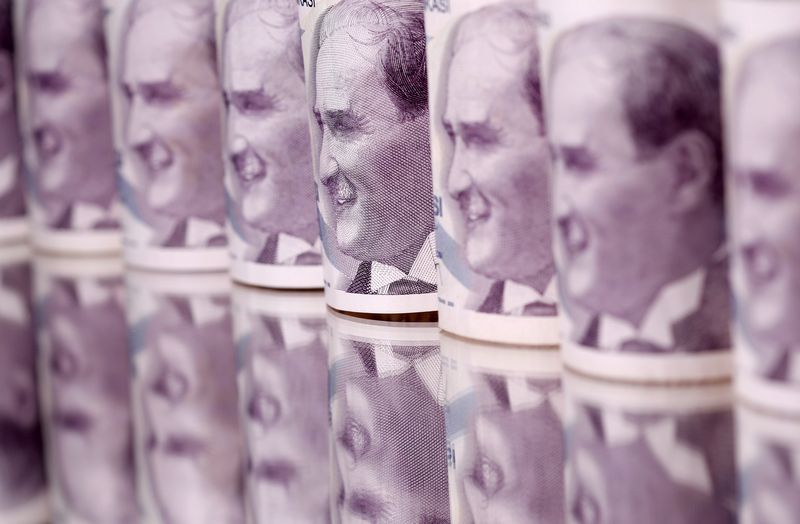By Ebru Tuncay
ISTANBUL (Reuters) - Some Turkish banks have begun to cut their lira deposit rates to ease pressure on margins, banking sources said, after rising interest rates during the central bank's rate tightening cycle curbed loan demand.
Deposit rates climbed in the second half of 2023 as Ankara implemented a policy U-turn towards greater orthodoxy, hiking rates sharply. It has also started to wind down the so-called KKM scheme, which aimed to protect lira deposits from what has been sustained depreciation since a late-2021 currency crisis.
Banking sources said deposit rates, which exceeded 52% on average at the end of 2023, dropped to as low as 44% at the start of this year as banks sought to manage their spreads amid concerns about the funding costs they were facing.
Until elections last May, when President Tayyip Erdogan won a new term, the central bank implemented an unorthodox, Erdogan-backed policy of low rates despite high inflation. Since the election, it has pushed up its policy rate by 3,400 basis points to 42.5%.
Loan rates and deposit rates climbed in parallel with the policy rate and a senior banker said banks are now seriously trying to control the cost side to manage spreads well.
The banking sector's net interest income decreased some 4% year-on-year in the January-November period to 632.6 billion lira ($21.3 billion) as unconventional policies widened the deposit-loan interest rate gap.
The contraction in net interest income neared 20% in the summer months.
Two banking sources said deposit rates at some top state and private banks decreased by up to 5 points, declining to provide names as they were not authorised to speak on the issue.
"Banks are trying to control costs. Inflation-indexed bonds no longer have as positive an effect as before," one source said.
Banks had been offering higher deposit rates to make lira deposits more attractive in line with the authorities' exit strategy from the KKM scheme, while loan demand has declined due to high interest rates.
The ratio of lira loans to domestic lira deposits has as a result decreased from 110% in January last year to 95% in November. This has led to growing cost pressures on banks.
Financial sector consultant and economist Arda Tunca said demand for commercial loans was quite weak.
"Banks' safes are full of deposits, but it is difficult for them to convert them into loans," Tunca said.

"This means banks hold deposits more than they need. Why not lowering funding costs then."
($1 = 29.6460 liras)